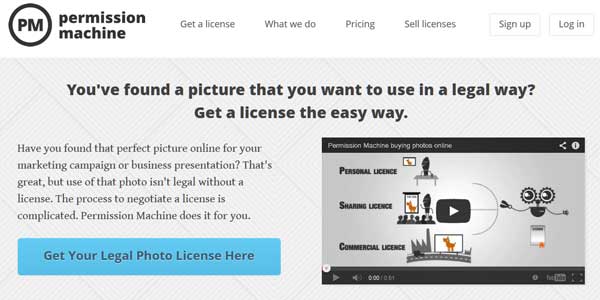Image pros want to support photographers and avoid copyright infringement, right? Thanks to Permission Machine, there is a new tool to accomplish this and more with just a few clicks.
In this age of automation, it’s inevitable that someone would find a way to streamline the often tedious process of negotiating image licenses. That someone is a smart and savvy creative tech and legal team based in Antwerp, Belgium and their mechanism is called Permission Machine (PM).
PM promises to solve problems for those of us entrenched in the image transaction business. “Our mission is to compensate photographers for their creative work and to give buyers a new way to quickly and legally license online images,” says Internet entrepreneur Tom Cuylaerts, PM’s CEO and co-founder.
Buyers and editors often have to bypass choosing a perfect image in favor of saving time. They’ll revert to searching for similar images using sources where the license terms are set in shopping cart menus, sidestepping the time it takes to introduce themselves to a photographer, explain what they want and negotiate usage terms and fees. They often purchase a broader (and more expensive) license than they really need.
“Social media platforms are seriously visual now. Twitter, Instagram, Facebook and LinkedIn have rejiggered their templates to prominently feature images,” adds Marc Van Steyvoort, PM’s media advisor. “That means editors are snowed under with more visuals than ever and licensing has to be fast and accurate.”
Here is where PM steps in to help. When buyers see a photo on Twitter that works for their project, they can easily ask the author for permission and generate a personalized license document via PM’s website.
Cuylaerts explains the process: “From our home page, click on “Get a license” and simply copy the Twitter or Twitpic image URL into the search field. Continue with verification, select your license and send the request for permission. PM does the rest by contacting the author.” After accepting, buyers pay via PayPal to the author’s account. The image is made available for download with a PDF of the license. All transactions are recorded in the buyer’s dashboard for future reference.
Buyers can also submit an image file they’ve downloaded to their local computer, allowing PM to extract the author’s information. Buyers do need to have the author’s email address for PM to make contact, but if they can’t determine one, PM offers to try to help locate the source.
Attorney and PM partner Ywein Van den Brande, crafted the usage licenses, giving two options: a Sharing License (10 Euros) or an Unlimited Commercial License (50 Euros).
“The Sharing License is perfect for these types of uses,” he says, and offers these examples: “You see a photo on Pinterest and want to tweet it from your company’s Twitter account; a follower tweets a photo featuring your client’s products and you want to post it on a Facebook page; a blog uses an image that works perfectly for your own blog.”
Basically, the Sharing License is crafted for social media cross-platform sharing, Web and blog usage for sites with less than 5000 views per month and for business presentations (such as a PowerPoint show or YouTube video).
Van den Brande wrote PM’s Unlimited Commercial License to apply to all other commercial and editorial uses. He claims it’s perfect when you need a license for ad campaigns or promo materials, and when you need a license for a blog or site with more than 5000 views per month. It also covers magazines and other printed materials, but keep in mind the resolution of the image will only be the same as the original online file you found.
In fact, PM is designed for licensing the low resolution files found across the Web. In situations where an online image license is successful and leads to a print campaign where buyers need larger files, they can contact the photographer again. This means the buyer has an opportunity to test a concept and the photographer has a chance to receive more revenue.
Cuylaerts and his team also wanted a way for photographers—and ultimately all online publishers—to make money from the images they own. “It’s really easy now with PM’s licensing mechanism. When someone buys a license to your photo, the money is transferred to your PayPal account after PM’s deduction of our transaction fee,” he says. “Photographers and other authors can wait until someone sends them a request or they can take the initiative and register with PM,” he adds.
PM provides a simple script that can be added to any website. The code automatically adds a PM Button to the images that viewers can click to buy a legal license. For photographers or practically any company with content to license, PM offers a quick way to become a simple social media stock agency for online images.
Right now, Twitter is the chief platform so PM works perfectly for breaking news images and live events where buyers want to quickly reuse a shared photo. And Twitter is so searchable that practically every topic leads to great shots so buyers can confidently use Twitter as a go-to source, knowing the permission process will be a snap.
Several other features are being built; Instagram is next and PM is rapidly adding more options. Buyers will also enjoy PM’s blog Permission Machine Talks, which provides usage advice and covers current online photo use and abuse case examples. Given the vast possibilities of PM, all picture pros will want to keep up with this encouraging tech development as methods for online rights transacting continue to evolve.



Comments
While I rarely find myself searching for a low res file, or the rights to use a low res file, I’m often frustrated at how images posted or shared online are void of ownership information making it difficult to find a high res copy.
I can see how the Permissions Machine would help that and hope those who post their images on social media sites will give it a try.
Thanks for an informative article Jain.